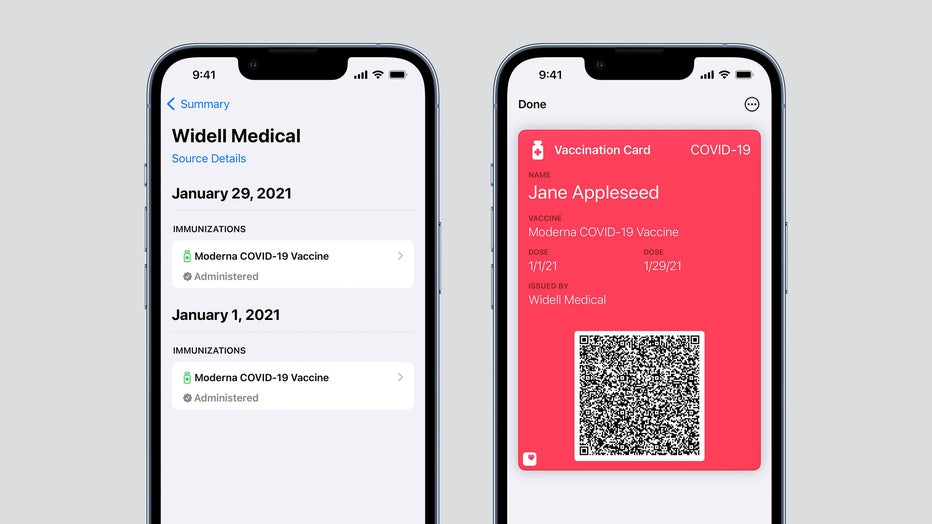iPhone users will soon be able to add COVID-19 vaccination card to Apple Wallet
LOS ANGELES - iPhone owners will soon be able to add a digital copy of their COVID-19 vaccination card to their Apple Wallet, thanks to an upcoming software update.
A spokesperson for Apple confirmed that while the feature to add a COVID-19 vaccination card specifically to Apple Wallet is not available just yet, it will be in an upcoming update.
For now, the most recent iOS 15 update released on Sept. 20 allows users to add their vaccination status to their health app where other health information including medications and health status can already be documented.
According to an Apple developer blog post published Tuesday, iPhone users can download and store verifiable health records, including COVID-19 vaccinations and test results in the phone’s health app.
"Users can choose to share verifiable health records stored in the Health app with approved third-party apps requesting this information, like airlines, event venues, and other businesses that facilitate in-person interactions," the developer blog reads.

Apple to soon allow iPhone users to add their COVID-19 vaccine cards to their Apple Wallet's.
The new update comes as a rapidly growing number of cities across the U.S. are requiring people to show proof they have been inoculated against COVID-19 to teach school, work at a hospital, see a concert or eat inside a restaurant.
New York City, New Orleans, San Francisco and Los Angeles were among some of the first cities to impose such rules at many businesses last month.
The measures are an attempt to stem the rising tide of COVID-19 cases that has pushed hospitals to the breaking point.
When New Orleans imposed its vaccination mandate in August, Mayor LaToya Cantrell called proof of vaccination the best way to protect businesses. She said she is not imposing capacity limits or contemplating a shutdown similar to the one that devastated businesses in 2020.
"Unlike this time last year, we have a tool that we did not have," she said, referring to vaccines.
Last month, Louisiana set daily records for the number of people hospitalized with COVID-19, reaching 2,907 patients on Aug. 13. Ninety-one percent of those hospitalized were unvaccinated, according to state data.
Meanwhile across the nation, more Americans have now died from COVID-19 than did in the 1918-19 Spanish flu pandemic — approximately 675,000.
This grim statistic is prompting health and state officials to sound the alarm on the need for more Americans to get vaccinated.
The U.S. population a century ago was just one-third of what it is today, meaning the flu cut a much bigger, more lethal swath through the country. But the COVID-19 crisis is by any measure a colossal tragedy in its own right, especially given the incredible advances in scientific knowledge since then and the failure to take maximum advantage of the vaccines available this time.
Just under 64% of the U.S. population has received as least one dose of the vaccine, with state rates ranging from a high of approximately 77% in Vermont and Massachusetts to lows around 46% to 49% in Idaho, Wyoming, West Virginia and Mississippi.
RELATED: COVID-19 has killed about as many Americans as the 1918-19 flu
Globally, about 43% of the population has received at least one dose, according to Our World in Data, with some African countries just beginning to give their first shots.
"We know that all pandemics come to an end," said Dr. Jeremy Brown, director of emergency care research at the National Institutes of Health, who wrote a book on influenza. "They can do terrible things while they’re raging."
COVID-19 could have been far less lethal in the U.S. if more people had gotten vaccinated faster, "and we still have an opportunity to turn it around," Brown said. "We often lose sight of how lucky we are to take these things for granted."
The current vaccines work extremely well in preventing severe disease and death from the variants of the virus that have emerged so far.
The Associated Press contributed to this story.


